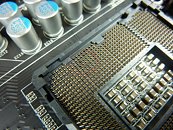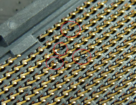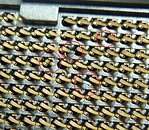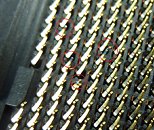- Joined
- Oct 9, 2007
- Messages
- 47,684 (7.42/day)
- Location
- Dublin, Ireland
| System Name | RBMK-1000 |
|---|---|
| Processor | AMD Ryzen 7 5700G |
| Motherboard | Gigabyte B550 AORUS Elite V2 |
| Cooling | DeepCool Gammax L240 V2 |
| Memory | 2x 16GB DDR4-3200 |
| Video Card(s) | Galax RTX 4070 Ti EX |
| Storage | Samsung 990 1TB |
| Display(s) | BenQ 1440p 60 Hz 27-inch |
| Case | Corsair Carbide 100R |
| Audio Device(s) | ASUS SupremeFX S1220A |
| Power Supply | Cooler Master MWE Gold 650W |
| Mouse | ASUS ROG Strix Impact |
| Keyboard | Gamdias Hermes E2 |
| Software | Windows 11 Pro |
Last year, credible reports of a design defect with LGA1156 sockets made by a certain component manufacturer in particular, made headlines. Reviewers found that extreme overclocking using increase voltages, in test cases, caused certain pins of the socket to burn out, damaging both the board and processor. The defect was found to be caused by shorting between the pins and the socket causing tiny electrical arcs. Motherboard reviewer from TechReaction.net discovered that his Gigabyte GA-P67A-UD4 and GA-P67A-UD7 samples showed signs of socket burn. The publication is yet to receive a reply from the board manufacturer.
LGA1155 and LGA1156 are very similar in physical pin layout, chip package, and retention clips, although the pin-maps are significantly different. TechReaction comments that while only "extreme conditions" cause such pin burnouts, 24/7-stable overclocked settings could, over a period of time, create similar conditions. Only time, and extensive testing will reveal if burnouts are a cause for concern to enthusiasts.




View at TechPowerUp Main Site
LGA1155 and LGA1156 are very similar in physical pin layout, chip package, and retention clips, although the pin-maps are significantly different. TechReaction comments that while only "extreme conditions" cause such pin burnouts, 24/7-stable overclocked settings could, over a period of time, create similar conditions. Only time, and extensive testing will reveal if burnouts are a cause for concern to enthusiasts.




View at TechPowerUp Main Site






